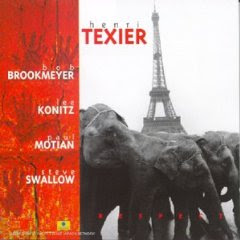
My good friend Ken Laster did a podcast on Lester Young at his podcast In The Groove, which I can't praise enough. The podcast I mean, though the Pork Pie Hat tribute was delicious. I especially liked the Kevin Mahogany version of Mingus's incomparable standard 'Goodbye Pork Pie Hat,' with its lyrics. I also enjoyed very much Ken's previous podcast on the Autumnal Equinox. It almost had me dancing naked around a pole. Almost. Anyway, just in case any of my readers don't know about In the Groove, know about it now. I have probably purchased a hundred albums after hearing cuts on his shows.
Anyway, Ken's podcast put me in a nostalgic frame of mind. I have been concentrating on some pretty edgy jazz in recent months, and avant garde is laconic if nothing else. Well, one end of the spectrum can breed a taste for the other. So what should arrive on my doorstep today but a two CD collection by Ben Webster: Music for Loving. This music is so lush and plump you could use it for an airbag in an acrobatic jump.
I first heard Ben Webster on an album with Coleman Hawkins. I don't have it anymore, so I can't tell, but the memory suggests wonder. Anyway, Music for Loving is a splendid collection. A lot of it is Webster playing his tenor with a string orchestra behind him. I don't listen to a lot of that kind of music, but this is worth listening to. Some of the recordings are before a smaller combo, and a Harry Carney album is included. It is a very rich package of very rich jazz. Webster's sound has haunted every tenor who came after him. Get haunted with these samples:
Ben Webster/Do Nothing Till You Hear From Me/Music for Loving
Ben Webster/My Funny Valentine/Music for LovingEnjoy. And don't forget to post a comment.






 On September 6, 2009, I had the opportunity to sit down with the great bass player and composer
On September 6, 2009, I had the opportunity to sit down with the great bass player and composer 



